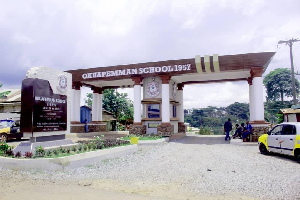- Home - News
- TWI News | TV
- Polls
- Year In Review
- News Archive
- Crime & Punishment
- Politics
- Regional
- Editorial
- Health
- Ghanaians Abroad
- Tabloid
- Africa
- Religion
- Election 2020
- Coronavirus
- News Videos | TV
- Photo Archives
- News Headlines
- Press Release
Regional News of Wednesday, 11 October 2006
Source: GNA
UDS Holds Fourth Matriculation Ceremony
Navrongo (UER), Oct. 11, GNA- The Ghana Education Trust Fund (GET-fund) has supported the University for Development Studies (UDS) with a total of about 115.3 billion cedis for infrastructural development between 2002 and 2005.
About 90.3 billion cedis went into civil works, while 25 billion cedis was used for equipment, services and the cost of training clinical students at the Kwame Nkrumah University of Science and Technology (KNUST) and Legon.
Professor John Bonaventure Kaburise, Vice-Chancellor of UDS, announced this in a speech at Navrongo on Wednesday during the University's 14th Matriculation Ceremony.
He said between 2004 and 2006 the University had benefited about 20.9 billion cedis from the Teaching and Learning Innovative Fund (TALIF) provided under the World Bank Project.
He announced that the hotel complex being constructed in Tamale by the Government for the CAN 2008 would be handed over to the University after the tournament, and would be expected to ease the accommodation problem faced by students on campus.
Professor Kaburise noted that as compared to the previous years, these developments had in a way created an enabling environment, and commended the Management of the GET-Fund and TALIF for their immense support for University.
He announced that out of the 4,515 applications received for the various programmes for 2006/2007 academic year, 4,328 were qualified but the University could only admit 2,640 students. In addition, eight students who offered to do postgraduate degree programmes were also matriculated.
Explaining the vision of the University, the Vice Chancellor said the UDS was established under the PNDC Law 279. Section 2(C) to blaze a new trail by effectively combining academic work with field practical training and a community-based focus.
The University, he noted, has thus been specifically assigned a developmental role in the northern sector and the deprived rural areas of Ghana. "Its principal objective in this regard is to address the deprivations and environmental problems, which characterize northern Ghana and other rural areas."
He said to be able to fulfill its mandate, the University had adopted a compulsory integrated Third Trimester Field Practical Programme by which integrated teams of students from all the faculties are sent to communities for practical training.
Professor Kaburise stated that this system allowed students from the various faculties to holistically comprehend and analyse the developmental challenges of the communities.
"The UDS does not intend to produce intellectually displaced persons," he added.
He explained that the ability needed by students to make practical application of knowledge implies that they should not only be equipped with technical knowledge required in their chosen profession but must also have the ability to work with people in its application, and said that was just what the UDS was training people for.
Professor Kaburise cautioned the incoming students to study hard and to desist from engaging in any malpractices to gain advantage during examinations or when caught would be dealt with severely.
He called on parents to desist from interfering unnecessarily in the University's affairs especially when the University instituted measures to deal with their wards who engaged in acts of indiscipline on campus. He urged the students to register for the National Health Insurance Scheme (NHIS) and said the University would pay for the premium.










